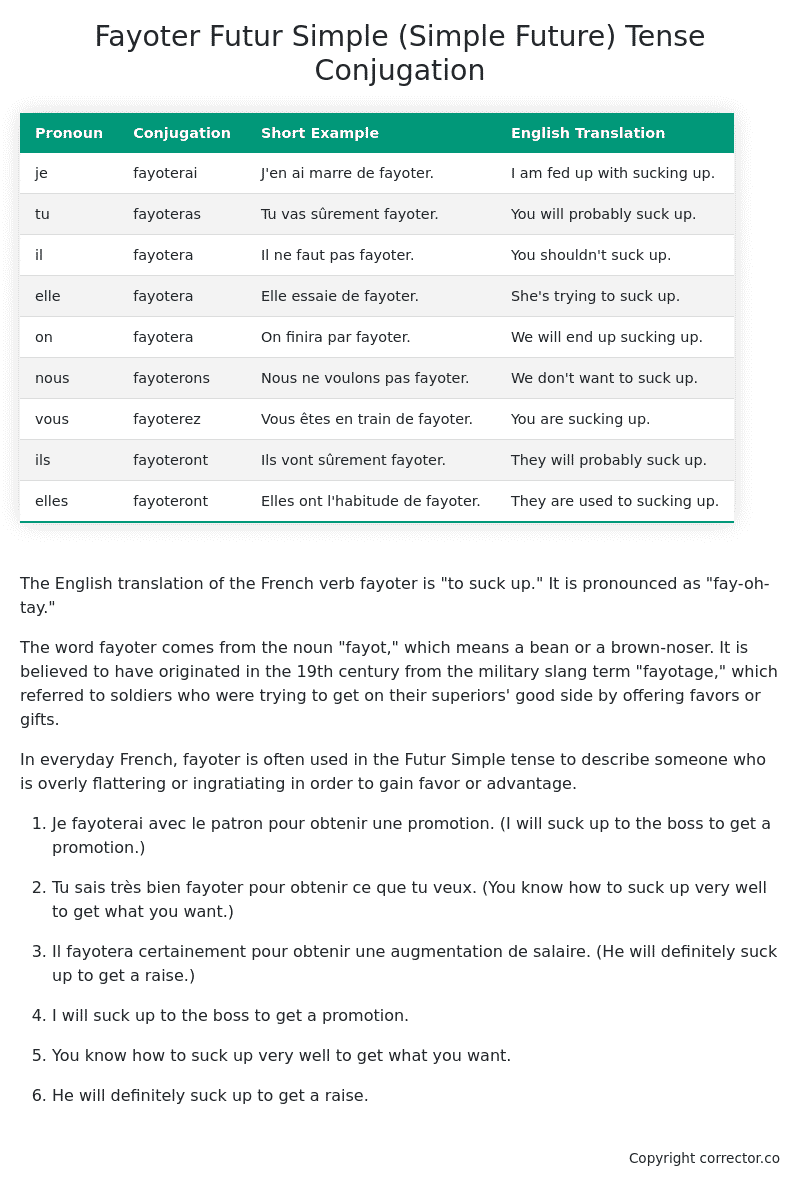Futur Simple (Simple Future) Tense Conjugation of the French Verb fayoter
Introduction to the verb fayoter
The English translation of the French verb fayoter is “to suck up.” It is pronounced as “fay-oh-tay.”
The word fayoter comes from the noun “fayot,” which means a bean or a brown-noser. It is believed to have originated in the 19th century from the military slang term “fayotage,” which referred to soldiers who were trying to get on their superiors’ good side by offering favors or gifts.
In everyday French, fayoter is often used in the Futur Simple tense to describe someone who is overly flattering or ingratiating in order to gain favor or advantage.
-
Je fayoterai avec le patron pour obtenir une promotion. (I will suck up to the boss to get a promotion.)
-
Tu sais très bien fayoter pour obtenir ce que tu veux. (You know how to suck up very well to get what you want.)
-
Il fayotera certainement pour obtenir une augmentation de salaire. (He will definitely suck up to get a raise.)
-
I will suck up to the boss to get a promotion.
-
You know how to suck up very well to get what you want.
-
He will definitely suck up to get a raise.
Table of the Futur Simple (Simple Future) Tense Conjugation of fayoter
| Pronoun | Conjugation | Short Example | English Translation |
|---|---|---|---|
| je | fayoterai | J’en ai marre de fayoter. | I am fed up with sucking up. |
| tu | fayoteras | Tu vas sûrement fayoter. | You will probably suck up. |
| il | fayotera | Il ne faut pas fayoter. | You shouldn’t suck up. |
| elle | fayotera | Elle essaie de fayoter. | She’s trying to suck up. |
| on | fayotera | On finira par fayoter. | We will end up sucking up. |
| nous | fayoterons | Nous ne voulons pas fayoter. | We don’t want to suck up. |
| vous | fayoterez | Vous êtes en train de fayoter. | You are sucking up. |
| ils | fayoteront | Ils vont sûrement fayoter. | They will probably suck up. |
| elles | fayoteront | Elles ont l’habitude de fayoter. | They are used to sucking up. |
Other Conjugations for Fayoter.
Le Present (Present Tense) Conjugation of the French Verb fayoter
Imparfait (Imperfect) Tense Conjugation of the French Verb fayoter
Passé Simple (Simple Past) Tense Conjugation of the French Verb fayoter
Passé Composé (Present Perfect) Tense Conjugation of the French Verb fayoter
Futur Simple (Simple Future) Tense Conjugation of the French Verb fayoter (this article)
Futur Proche (Near Future) Tense Conjugation of the French Verb fayoter
Plus-que-parfait (Pluperfect) Tense Conjugation of the French Verb fayoter
Passé Antérieur (Past Anterior) Tense Conjugation of the French Verb fayoter
Futur Antérieur (Future Anterior) Tense Conjugation of the French Verb fayoter
Subjonctif Présent (Subjunctive Present) Tense Conjugation of the French Verb fayoter
Subjonctif Passé (Subjunctive Past) Tense Conjugation of the French Verb fayoter
Subjonctif Imparfait (Subjunctive Imperfect) Tense Conjugation of the French Verb fayoter
Subjonctif Plus-que-parfait (Subjunctive Pluperfect) Tense Conjugation of the French Verb fayoter
Conditionnel Présent (Conditional Present) Tense Conjugation of the French Verb fayoter
Conditionnel Passé (Conditional Past) Tense Conjugation of the French Verb fayoter
L’impératif Présent (Imperative Present) Tense Conjugation of the French Verb fayoter
L’infinitif Présent (Infinitive Present) Tense Conjugation of the French Verb fayoter
Struggling with French verbs or the language in general? Why not use our free French Grammar Checker – no registration required!
Get a FREE Download Study Sheet of this Conjugation 🔥
Simply right click the image below, click “save image” and get your free reference for the fayoter Futur Simple tense conjugation!

Fayoter – About the French Futur Simple (Simple Future) Tense
Formation of Futur Simple
For regular -er verbs (e.g., parler – to speak)
For regular -ir verbs (e.g., finir – to finish)
For regular -re verbs (e.g., vendre – to sell)
Common Everyday Usage Patterns
Conditional Statements
Interactions with Other Tenses
Futur Antérieur
Conditional
Present
Summary
I hope you enjoyed this article on the verb fayoter. Still in a learning mood? Check out another TOTALLY random French verb conjugation!


